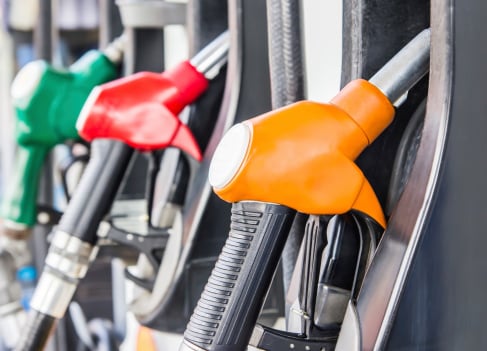The cost of gasoline is still low compared to a year ago and has flattened recently at about $2.76 for the average price for a gallon of regular nationwide. However, there are seven states where the price of gas has remained stubbornly above $3 a gallon. They are Alaska ($3.48), Hawaii ($3.38), California ($3.43), Oregon ($3.14), Washington ($3.20), Idaho ($3.04) and Nevada ($3.20). Source: Thinkstock
Source: Thinkstock
The price of gas last week was $2.78 and a month ago $2.76. Each of these is well below the year-ago national average price of $3.66. Most of the drop can be accounted for by the price of oil. Beyond that, state gas taxes and proximity to refineries affect the price.
The price for a barrel of crude was $106 a year ago. The number has been around $60 recently. A slowing economy in China and renewed fracking activity in the United States have accounted for much of the drop.
However, there are two other critical factors in gas prices. For example, the price for an average gallon of regular is $2.43 in South Carolina, where there are a number of large refineries. The same is true in Mississippi, where the price is $2.47. Politics favor low gas prices in both states. State, federal and excise taxes on gas in South Carolina are the third lowest among all states at $0.35 per gallon, according to the American Petroleum Institute. Mississippi ranks fifth lowest by the same measure, at $0.37.
At the other end of the spectrum, among states with high gas prices, the tax levels are well above the national average of $0.49 per gallon. Hawaii is the third highest at $0.63. Adding to the price of gas on the islands is the fact that the state has almost no refinery capacity of its own. Gasoline has to be shipped from either the West Coast or Asia. Washington has a gas tax of $0.56. The figure for California is $0.61. Six of the eight states with gas prices above $3 also have tax rates on a gallon of gas above the national average.
The primary influence on gas prices will always be oil. Over time, however, states may raise or lower gas taxes — increases are likely to be the norm as states try to find money to rebuild infrastructure for which they have no other means to add to treasuries. In those states, the cost of crude oil may have less of an effect.
ALSO READ: The States With the Strongest and Weakest Unions
ALERT: Take This Retirement Quiz Now (Sponsored)
Take the quiz below to get matched with a financial advisor today.
Each advisor has been vetted by SmartAsset and is held to a fiduciary standard to act in your best interests.
Here’s how it works:
1. Answer SmartAsset advisor match quiz
2. Review your pre-screened matches at your leisure. Check out the advisors’ profiles.
3. Speak with advisors at no cost to you. Have an introductory call on the phone or introduction in person and choose whom to work with in the future
Take the retirement quiz right here.
Thank you for reading! Have some feedback for us?
Contact the 24/7 Wall St. editorial team.



